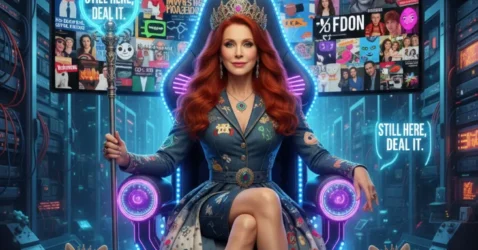A Paw-sitive Force: How a Rescue Puppy Became the Heart and ‘Security’ of Ukrainian Soldiers in Donbass
The ongoing conflict in Ukraine is a stark and painful reminder of the uncertainty and hardship millions face every day. The Russian-Ukrainian war has forced countless families to flee their homes or seek refuge in cramped, terrifying bomb shelters. In such grim times, it can feel like kindness is a scarce commodity, making stories of human (and canine) compassion all the more powerful.
Amidst the darkness on the frontlines in Donbass, a heart-warming tale of rescue and camaraderie has emerged, shining a light on the enduring spirit of the Ukrainian soldiers. Their newest, smallest, and most adorable recruit—a stray puppy named Rambo—has become an unlikely viral sensation and a much-needed source of comfort and vigilance for the troops.
From Freezing Stray to Frontline Darling
As confirmed by reports, including one from The Independent, several Ukrainian soldiers came across a tiny, frightened puppy that was freezing in the harsh conditions. In a moment of pure empathy, they decided to take the stray in, offering him warmth, safety, and a new family.
A video capturing this touching event was posted online by Freedom News, quickly garnering millions of views and warming hearts across the globe. This little black pup, with light markings on his belly and legs, was christened Rambo—a formidable name for such a small creature, yet one he seems determined to live up to.
He quickly adjusted to his new surroundings, captured on video proudly strutting around the base, getting to know his new home and his new comrades. The soldiers themselves couldn’t resist his charm. One sweetly commented that Rambo was their new protector. It’s safe to say, he’s taking his job seriously.
The New ‘Security’ of the Donbass Trenches
Rambo isn’t just a mascot; he’s a working dog and a valuable member of the troop. The soldiers have affectionately dubbed him “our security,” recognizing the practical value he brings to the base.
One troop member told Freedom News TV that being the guard is “his job,” and Rambo performs it diligently. He uses his keen canine senses to alert his fellow soldiers whenever a stranger is near, providing an early warning system that is invaluable in a combat zone.
Recalling the very beginning of their friendship, one soldier noted just how tiny Rambo was—small enough to fit in the palm of a hand. This tiny creature has had a huge impact, bringing waves of much-needed joy and lightness to an incredibly difficult situation.
Rambo’s Four-Legged Comrades
While Rambo has become the face of this story, he isn’t the only dog bringing solace and protection to the Ukrainian soldiers. His older canine siblings also play a crucial role in safeguarding their human pack.
These dogs are more than just pets; they are sentinels. As one soldier wisely commented, “something that a human won’t hear, the dog will, they feel it.” Their superior hearing and sense of smell enhance the troop’s security in ways humans cannot match, truly cementing their title as man’s best friend.
Rambo’s siblings include Muha, Babai, and Malisha, whose name adorably translates to “baby.” They, too, are an integral part of the frontline family, stomping around in the mud alongside their comrades, asking for nothing but love and loyalty in return.
A Therapeutic Presence in Trying Times
Staying optimistic feels like an impossible task for these troops who have been on the frontlines for too long, many of them missing the families they left behind. The presence of Rambo and his siblings acts as a powerful therapeutic anchor in their lives.
These dogs provide a peaceful and nonjudgmental presence, a crucial emotional outlet in a high-stress environment. Beyond the emotional support, their unique skills and enhanced hearing are literally helping to save lives. They represent a slice of normalcy and unconditional affection in a world turned upside down by war.
Global Outpouring of Love and Support
Rambo’s story has resonated deeply with people around the world, leading to an outpouring of love and support in online comments. Readers share a collective hope for the pup and his new family.
“Be well tiny Rambo,” one user commented, while another reflected, “It’s that kind of emotionally charged situation, any relief is welcome I’m sure. A puppy is an amazing thing.” The story highlights the deep emotional need for moments of tenderness, even as the world watches the explosions and destruction. One commenter perfectly captured this mix of emotions, saying that as the world focuses on the conflict, “I’m gonna have ‘I hope Rambo is ok’ in the back of my head.”
The story of Rambo and the ‘trench pups’ serves as a reminder that even in the most devastating of times, kindness and compassion can be found, and that the simple, pure love of an animal can be a force for both healing and security.
Do Your Part for the Cause
As this story highlights the personal sacrifices and resilience of the Ukrainian people, it serves as a powerful call to action. We encourage everyone who is moved by Rambo’s story and the bravery of the soldiers to do what you can to help Ukraine in this devastating battle.
If you are looking for reputable ways to contribute, consider donating to organizations that are funding essential Ukrainian war and humanitarian efforts, such as Monobank and the Return Alive Foundation.
We hope that Rambo, his siblings, and all the Ukrainian troops remain safe and are soon reunited with their families, and that this war becomes nothing more than a historical memory.
















